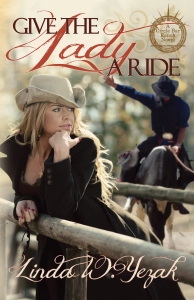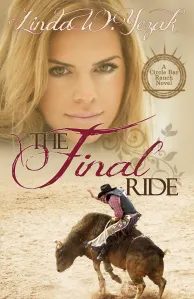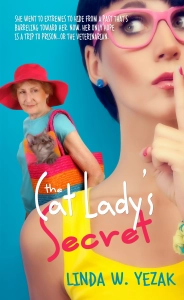 The best thing about crime shows–and crime books–is that the bad guy is gonna get punished. You know from the first that he’s going to go to prison for life or face the death penalty. You know his end is going to be ugly. That’s why you tune into the show or pick up the book. In fiction, at least, the good guys win, and the bad guys suffer to the extreme. Which is why I loved The Closer. I knew Brenda Leigh Johnson would outwit the criminal, catch him, drill him like a hot oil rig, and remind him of the evils he’ll face during his long, miserable prison sentence. It was satisfying.
The best thing about crime shows–and crime books–is that the bad guy is gonna get punished. You know from the first that he’s going to go to prison for life or face the death penalty. You know his end is going to be ugly. That’s why you tune into the show or pick up the book. In fiction, at least, the good guys win, and the bad guys suffer to the extreme. Which is why I loved The Closer. I knew Brenda Leigh Johnson would outwit the criminal, catch him, drill him like a hot oil rig, and remind him of the evils he’ll face during his long, miserable prison sentence. It was satisfying.
But plea bargains aren’t satisfying. They’re realistic. Everyday, some criminal somewhere is getting his sentence reduced because of the realities of the system. It’s not fair. It’s not fair to the victim or the victim’s family that someone who deserves a severe punishment doesn’t get it. It’s not fair to the community that someone like him will be released upon them sooner than he should be. He’ll get a slap on the hand compared to what he ought to get. It’s certainly not justice. But, like “Lt. Flynn” in Major Crimes says, “Dirt bags get deals. It happens every day.”
Yes, but not in fiction. That’s not the point of crime fiction. In fictional crime stories, almost everything is in black and white. We know who ought to fry and who ought to receive mercy–and in fiction, more often than not, the end of the story fulfills what we expect, and we walk away satisfied with the experience. On occasion, what is deserved isn’t received, but there are reasons beyond the detectives’ control. Whenever we watch crime shows, we see the shaky relationship between the detectives and the DA’s office, the pure enmity between the detectives and defense attorneys–all because the detectives work hard to bring to justice bad guys who don’t always get what they deserve thanks to plea bargains and technicalities.
What we never see is a group of detectives going into a case with the deliberate intent of bringing it to a plea bargain.
Where’s the satisfaction in that?
But this is what Major Crimes is trying to push as acceptable. Assistant Chief Taylor glows as he talks about how much money the city saves by skipping the courts and offering a lesser sentence. Captain Sharon Raydor is giddy over the idea of by-passing the risks in the court system and walking a criminal straight to his cell.
Yeah, courts are iffy, juries are unpredictable–all this is true in real life. But in fiction, we are supposed to walk away with the satisfaction of knowing the bad guy who committed first degree murder and deserves life in prison is going to get life in prison. He’s not going to get eleven years on a plea bargain to manslaughter. Even though he commits murder, he’ll be eligible for parole in five to seven years. Where’s the justice in that?
What kills me is that detectives in the show develop a case that would stand up in court with the intent of offering the defendant a lesser charge. Good grief. Where’s the satisfaction in that? It’s like running a grueling race, then stopping an inch from the finish line saying, “that’s good. That’s close enough.”
I don’t know that I’m going to watch the show again, but if I do, it’ll be to see if my hunch is right. The way I see it, either the creators of Major Crimes are going to have to soften their crimes so plea bargains do become a satisfactory ending, or they’re going to have to make us more sympathetic and understanding toward criminals. Either way, they’re missing the appeal crime shows have to those of us who watch them: In fiction, at least, the bad guy gets punished to the fullest extent of the law.
~~~~~~~~~~~~~~~~~~~~~~
Don’t forget: The Canopy Bookstore is having a close-out sale!
We’re having to close the little traveling store for the rest of the year, so I’m giving everyone one more chance to buy the books before I have to send them back to the authors.
The book featured this week is I Called Him Dancer by Eddie Snipes. Find out more about it here!



















Been reading and watching mystery much of my life. But not for the satisfaction of good winning over evil at the end of the day. The thrill is the chase. It is the peeling back of the onion no matter how odious to find the truth of the matter; more aptly put, to solve the puzzle the mystery has presented. Who really did the dirty deed?
As for the plea-bargaining, etc. I agree with you that this is part and part of the legal system. That being said, I’m a Law & Order fan and they don’t always get the bad guy. Sometimes the evil doer gets away with his or her nasty deed. Sometimes the plea-bargain process puts the wrong person behind bars.
I watched “Major Crimes” and I enjoyed it. I’m happy to see some of my favorite characters from “The Closer” take on a new venture, one that is more serious. I also enjoyed “The Closer.” I think it’s a bit early in the game to call “Major Crimes” cheats. Heck, we’re still in the voir dire stage and haven’t even seated a jury.
LikeLike
I’m glad you like the show, and I agree that the appeal is the chase, but the satisfaction for me is a “good wins over evil” ending, and if it doesn’t end that way, I want a better reason than saving the city some money.
Law and Order is a favorite of mine too, and you’re right–the bad guy doesn’t always get what he deserves, or innocent people are put away erroneously. But the detectives on the show never go into an investigation with the intent of letting a murderer plead down manslaughter. I think that’s the point that bothers me.
You’re right. It’s early. We’ll see.
LikeLike
I agree with you, Linda. I was so disappointed, since I really like the team from Closer. But there are plenty of other things to watch and I’ll probably do that.
LikeLike
Yeah, I was happy to see them keep most of the same characters. Had high hopes for the show. But “The GroundHog” above has a point, it’s early. Maybe the creators will see the error of their ways.
LikeLike
I’m not familiar with the show, but I will agree it doesn’t sound like a satisfying conclusion. I’m not a big fan of the cop-show drama in general (with a few exceptions, such as Castle), but I do like justice!
LikeLike
I’ve always been a fan of mystery in all its forms. I wish I could write it, but my mind just doesn’t seem devious enough.
LikeLike
I actually feel more satisfied, seeing that criminals are not given a chance to win in court and to be found not guilty. 11 years for killing a rapist and 30 years for two not-quite-proven murders were totally ok for me in these first episodes of Major Crimes.
LikeLike
I could agree with the first you mention. Giving the accused a lighter sentence for killing someone who deserved it is a time-honored trick in fiction. Of course, in reality, it promotes vigilantism.
But I go back to my point: when the ****intent**** of the investigation is to bring a perpetrator to a plea bargain instead of the fullest sentence allowed by law, the outcome of the show is less than satisfying for me.
LikeLike
As for the plot with rapist, for me it was more about emotions, than premeditation (attempt to accuse innocent person followed, not preceded), that’s why I think 11 years were quite fair.
Well, the intent of investigation is to find out, who committed the crime. This task is done successfully in Major Crimes. But here we also know the sentence immediately, and I really like it. In The Closer we could just guess, if the criminal goes to jail at all. Brenda’s tricky confessions might have been not always valid in court.
Also, I’m quite sure, that in one (or more) of upcoming episodes, there will be a situation, when mechanism of plea bargain will completely fail, and will not satisfy neither Raydor, nor her team. And I’m looking forward for it!
LikeLike
I’m enjoying this discussion. I haven’t written anything controversial in a long time–who knew it would be over a TV show! 😀
Yeah, the intent of every investigation is to find the perp and to bring him to justice. In fiction, I like “justice” to be the fullest sentence the law allows, so in cop shows that end simply with the BG getting caught, I like thinking the BG is going to get the full sentence. That’s not the way it happens in real life, so I enjoy the fantasy world.
Maybe that’s why I write romance. “Happily ever after” doesn’t work for crime novels–the criminal doesn’t always get what he deserves, nobody is really satisfied with the outcome. As for Major Crimes, I doubt I’ll be satisfied with the outcome when I know from the beginning of the show that whatever the BG did, he won’t get the punishment he deserves, he’ll get a plea to a lesser charge which allows him a shot at parole far earlier.
LikeLike
I’m also enjoying, as I haven’t written in English for a long time (I’m a foreigner) 😀 And I’m surprised, that it’s Major Crimes, which made me lately quite “discussive”.
Again about 2nd episode – I think they got more with that deal, than they would get in court. Brilliant argumentation by Raydor and DDA frightened the lawyer and that women. So, I don’t think it was “lesser” punishment. I also don’t think Raydor would go for lesser, being so loyal to laws, so I’m expecting a good fight with Taylor soon – but, again, we’ll see in upcoming episodes.
LikeLike
Ah! Are you one of my Polish readers? My husband will be so excited to hear this–his family is from Poland. Your English is great. I never suspected it wasn’t your native language.
Next time Major Crimes comes on, I’ll think about you while I’m watching. 🙂
LikeLike
Yes, I’m from Poland. Tell “pozdrawienia” to you husband then! 🙂
Thank you! Spellchecker is the best friend of my English 😀
Oh, I hope, MC develops as I predicted, or – better – surprises both of us.
LikeLike
His father would’ve known what “pozdrswienia” meant, but we had to look it up. He says “thanks, and best regards to you too.” 🙂
LikeLike
I’ve learned about four types of stories: Whole, Bent, Broken, and Healing. Here is an explanation:
Sound like this show is a Broken type of show.
LikeLike